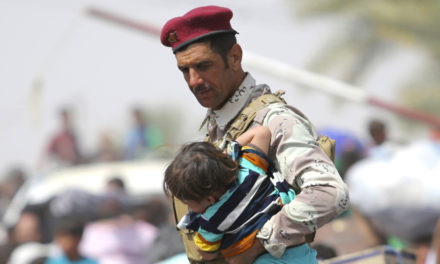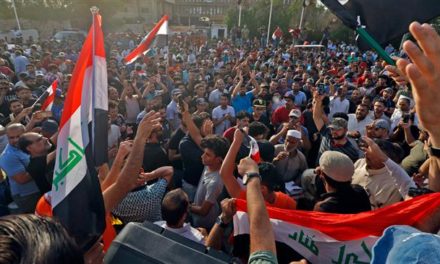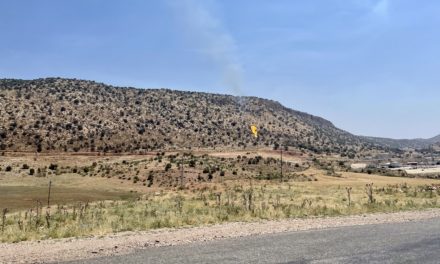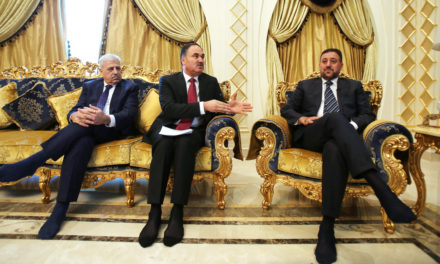Yesterday, Montadhar Naser was acquitted by an Iraqi court and charges brought against him for defamation were dropped. In a victory for press freedoms and freedom of expression in Iraq, the judge in the case declared there was insufficient evidence to uphold the charges, which many regarded as politically motivated. Naser had been subjected to legal and political persecution since publishing an investigation into corruption at Iraq’s Media and Communications Commission through the electronic news website, al-aalem al-jadid, where Naser was chief editor.
During last Friday’s protests by Iraq’s civil trend in Baghdad’s Tahrir Square, activists held signs expressing solidarity with the Iraqi journalist, drawing attention to this important case. The activists were also outside the court yesterday to celebrate Naser’s acquittal.
Back in February 2016, Naser published an investigative report through the news website al-aalem al-jadid, alleging corrupt practices at Iraq’s Media and Communications regulatory commission. The allegations focused on practices whereby bribes were paid by mobile phone companies in order for the commission to ignore inconsistent billing practices and prevent new entrants into the telecommunications market. Within hours of the report being published, Naser was forced to remove it from his website as he was subjected to legal threats, threatened with the closure of his website, and told he would be fired from his position at the Ministry of Culture. Naser appeared before Iraq’s Federal Media and Publishing Court on March 1st where he was pressured to reveal his sources, which he refused to do, and was subsequently released on bail but told he would face charges of criminal defamation. The case received critical international attention, including from the Committee to Protect Journalists who published a statement on the case in March which can be read here.
Over the weekend, as a prelude to Naser’s Monday hearing, al-akhbar published an interview with the journalist in which he talked about the consequences of his decision to take a stand against corruption in Iraq. The article details how Naser was expelled from his position in the Iraqi Media Network, his name was placed on a national security black list, his website was blocked, and criminal charges were brought against him. One of the ironies of the case which Naser highlights is that the lawsuit depended on law from the Ba’th period (articles 433, 434, and 435 on ‘slander and divulging secrets’.) “This is a serious paradox’ Naser states in the interview, ‘since the Iraqi parliament has banned Ba’th Party political ideas and activity, but has kept these Ba’th laws active because they favour the interests of the prevailing authorities.”

Montadhar Naser outside the court hearing on August 22, 2016
The Media and Communications Commission was established in June 2004 and was intended as an independent regulatory body unconnected to the government. However, the prevailing reality today is quite the opposite. The head of the Commission is Safa al-Din Rabia, who is a member of the governing Da’wa Party. The Commission regularly acts on the government’s orders e.g. in closing down satellite channels that overstep what the government considers the acceptable boundaries.
The operations of the Commission lack transparency. Critics have highlighted the significant debts owed by telecommunications companies to the Iraqi state, arguing that these funds could help ameliorate Iraq’s budget crisis. That these debts have been ignored has raised suspicions about corruption and the relationships of dependence between the major political parties and the telecommunications companies.
In exposing this corruption, Naser challenged key sites of power in the Iraqi establishment. His ability to do so depended on the upholding of key rights and freedoms that would protect him from political persecution through legal and unofficial channels. In his interview with al-akhbar, Naser highlights a growing trend which has seen attempts by Iraqi authorities to squeeze the space for these freedoms and rights: “Freedom of expression in Iraq is in serious danger. Steps to restrict general freedoms and particularly freedom of expression are increasing without debate over the legislation and laws. The only true guarantor of these freedoms today is the civil movement and the activists who struggle, individually and collectively, and stand as a dam against efforts to silence voices and close the doors to public freedoms.”

Ben Robin
Ben Robin is a PhD candidate at the Islamic and Middle East Studies department at the University of Edinburgh. He focuses on Iraq, protests, political activism, public sphere and Iraqi politics.










